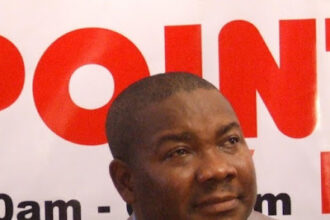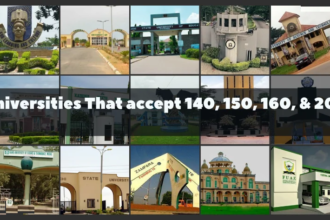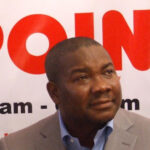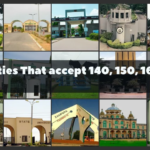PREFACE
Music plays vital roles in various aspects of celebrations among societies in Nigeria. In traditional festivals for example, music is an expression of the culture of the people. This paper examined the Role of Music in Abia Ohafia Community in Ohafia LGA using the Ikperikpe Ogu festival. For more clarification of the topic, it was broken down into chapters. Chapter one introduced the concept to be discussed as well as its early origin and definition. Chapter two delves into the topic proper discussing the roles of music in festival in Abia Ohafia community, early history of the Ohafia community, location of Abia Ohafia, and the Ohafia war dance (Ikperikpe Ogu) festival while chapter three concludes the topic discussed.
CHAPTER ONE
INTRODUCTION
Encyclopedia American International (1995) defined music as “the art by which a composer, through a performer as intermediary, communicates to a listener certain ideas, feelings or states of the mind”. Hornby (2000) on its part defined music as the arrangement of sounds in a pleasing sequence or communication to be sung or played on instruments”. The language of music however is not so straight forward as the language of some other disciplines. Besides expressing purely musical thoughts, it is also able to suggest definite emotions. With a little help from words or drama, it can be made to paint pictures and emotions but it is capable of awakening the emotions that had been aroused through music. Therefore, Luther in Glennon (1980) had this to say, “Music drives away the devil and makes people happy, it induces one to forget all wrath, unchastity, arrogance and other vices. After theology, I accord music the highest place and greatest honour”.
Music has played an important role in the activities of all people. It further explained that music functions at several cultural levels ranging from simple and direct folk utterances such as children’s games to high rituals. It plays a significant role in all societies, and exists in a historical era. A proper consideration of music should involve the musical sound itself, but should also deal with the concepts leading to its existence with its particular forms and functions in each culture and with the human behavior that is producing the sound.
More importantly too, the music of a particular society is by nature dynamic expressing the changed, changing and yet the changeable environment. The physical, natural, social and other environments in Nigeria are literally been diffused with its music. Music in the Nigerian society is largely functional and has close relationship with the worship of deities, ceremonies and for relaxation. In Nigeria for example, three classes of music exist, namely; the traditional or folk, popular and art or classical (Okafor, 2004a).
1.1 Early Origin/Etymology of the term
The word derives from Greek μουσική (mousike; “art of the Muses”). In Greek mythology, the nine Museswere the goddesses who inspired literature, science, and the arts and who were the source of the knowledge embodied in the poetry, song-lyrics, and myths in the Greek culture. According to the Online Etymological Dictionary, the term “music” is derived from “mid-13c., musike, from Old French musiqueand directly from Latin musica“the art of music,” also including poetry (also [the] source of Spanish música, Italian musica, Old High German mosica, German Musik, Dutch muziek, Danish musik).” This is derived from the “…Greek mousike (techne) “(art) of the Muses,” from fem. of mousikos “pertaining to the Muses,” from Mousa “Muse“. Modern spelling dates from the 1630s. In classical Greece, the term “music” refers to any art in which the Muses presided, but especially music and lyric poetry.”
CHAPTER TWO
ROLES OF MUSIC IN FESTIVALS: ABIA OHAFIA COMMUNITY
Festival is an occasion for celebrating especially a day or time of religious or cultural significance that recurs at regular intervals. It is a time people do something they normally do not; they abstain from something they normally do; they carry to the extreme behaviours that are usually regulated by measure; they invert patterns of daily social life. Reversal, intensification, trespassing and abstinence are the four cardinal points of festival behaviour. There are many festivals in Nigeria, some of which date to the period before the arrival of the major religions in this ethnically and culturally diverse society (museum collections 2013). The main Muslim and Christian festivals are often celebrated in ways that are unique to Nigeria or to the people of a particular society. The Nigerian Tourism Development Corporation has been working with the state to upgrade the traditional Nigeria festival, which may become important sources of tourism revenue. Among the Igbos of Nigeria, there is a wealth of cultural heritage manifested in ceremonies and festivals. Social phenomenon like marriage, birth, farming, harvest, victory and many other social institutions are celebrated. These cultural activities contain the germs of rich poetry and prose, excellent music and lively drama which have not been raised far above their traditional level although present day scholars – Sociologist, Anthropologist and Literary researchers are showing sufficient interest. Some of these works will be examined in relation to definition, function and structure. Ejizu noted that festivals are very popular and recurrent events in traditional African life. He summed it up by defining festivals as: Any special occasion, observance or celebration which may be religious or secular in nature and which is generally marked by merry-making, performance of music and the like. Festivals, according to Onwubike can in most cases be said to be a good measure of the intensity of the religious consciousness and cultural richness of a people. He further stated that feasts are the external manifestation of religion itself in every culture and they very often include sacrifice as a prominent part of their ritual. From these definitions, it is clear that festival is a celebration, a feast, a season of musical or other performance which involves joyfulness and merry making.
2.1 Early History of Ohafia
Ohafia is a town and local government area in Abia State, Nigeria. It is an Igbo speaking region. The ancestral capital of Ohafia is located in the village of Elu. The Ohafia Local Government Area also includes the towns of Abiriba and Nkporo. Historically, Ohafia people left Andoli and settled in Isi-Eke, from where they ran away one night, when they heard the rattling sound of calabashes. The sound was interpreted to mean that they were being invaded which lead to a commotion, as some of them escaped toward Ngodo and others went towards Isuochi. At one point, some of them headed towards Abam leading the group heading to Abam, was a man known as Ezeama Atita, and his two sons called Uduma Ezeama and Onyereobi Ezeama.
When they got to Abam, Onyereobi’s wife, who was heavy with pregnancy, could no longer walk. He, therefore, remained in Abam with his pregnant wife, while the group continued on the journey. In the present location of Ohafia, at a place called Ugwumgbo, Ezeama Atita, and his second son, Uduma, settled. After many years, their offspring established the 26 villages that make up today’s Ohafia. The ancestral headquarters of Ohafia is in Elu Ohafia. Each village is governed by an eze ogo. All the eze ogo’s come together to form the Eze Ogo-in-Council, which, with the amala, decide how the community is to be governed. The overall traditional ruler, Udumeze, who lives in Elu Ohafia, intervenes only when there is a matter between an Eze Ogo and a subject.
Ohafia is home to the third largest military base in Nigeria, named Goodluck Jonathan Barracks. It houses the headquarters of the newly established 14 Brigade and 145 Battalion office complex. Typically, Ohafia encompasses over twenty-six howntowns with population strength ranging between 800,000 and 916,000 as at 2014. The villages and towns in Ohafia are Elu,Ibina(Ihenta),Nde Okala, Nde Anyaorie,Amuma, Amaekpu, Ebem,Nde Amogu, Okagwe,Nde Uduma Ukwu, Oboro,Nde Nku, Nkwebi,Amuke, Asaga, Ndi Uduma Awoke, Amankwu, Nde Ibe, Nde Orieke,Okon-aku, Amangwu,Ufiele, Exiafor, Abia,Akanu,Isiugwu.
2.2 Location of Abia Ohafia
Ohafia is a clan as well as a local government area in Abia State, Nigeria. It is an Igbo speaking region. The ancestral capital of Ohafia clan is the centrally located village of Elu. Ohafia Local Government Area, is an administrative jurisdiction assigned by the Nigeria Government, which covers the entire Ohafia villages and other clans such as Abiriba and Nkporo, with its Administrative Headquarters at Ebem Ohafia. Abia Ohafia is located immediately after Akanu Ohafia separated by a small bridge connecting the two communities.
2.3 Role of Music in Ohafia War Dance Festival (IKPERIKPE OGU)
To be continued my people, its not an easy something….Drop your coments if you are following. Love you all!
REFERENCES
Alade, L. J (2013). “Nigerian festival and Cultural Tours,” in African Travel Magazine, vol. 1, no. 2, pp. 1, 2013.
Ehiwario, M.O. (2005). Music in Nigerian festivals with particular reference to Osiezi festival of Owa land. Journal of the association of Nigerian tmtsicologis, 2, 62 – 76.
Isichei, E. (1975). The Ibo people and the Europeans. London: Faber and Faber Ltd.
Iyeh, M.S. & Aiuede, C.D. (2005). An exploration of the therapeutic potency of music and dance in Ichu-Ulor festival of the Asaba people. Journal of the association of Nigerian musicologists, I (2,) 86-98.
Nigeria Festivals in Nigeria. [Online]. Available: http://www.onlinenigeria.com/festivals/.
Nketia, J.H. (1985). Music of Africa. New York: W.W. Norton & Inc. Ogali, A.O. (1985).
Ohafia War Dance. Retrieved from https://en.wikipedia.org/wiki/Ohafia_War_Dance, accessed on 25/12/2019.
Okafor, R.C. (2005). Music in Nigerian festival. Journal of the association of Nigerian musicologists, 1(2), 1 -28.
Onwuekwc, A. I. (2005). An analysis of Ekelebcm instrumental music and its role in festival in Uga, Journal of the association of Nigerian musicologists, I (2), 99 – 114.
Stone, R.M (1998). The garland encyclopedia of world music 1. New York: Garland Publisher. Inc.
Tamuno, T.N. (1968). The festival. Nigerian magazines. June/August. 126 – 127






